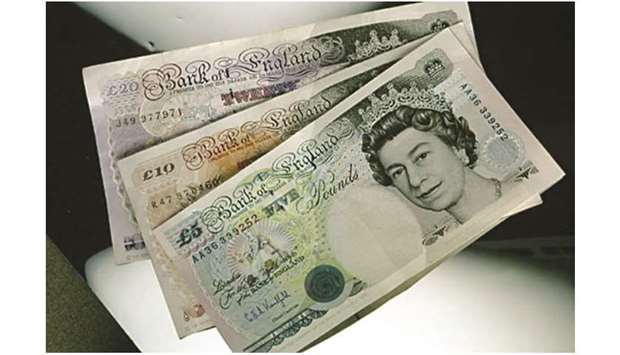The British pound had a tumultuous session yesterday as a draft Brexit deal between London and Brussels sparked both hope and scepticism in a volatile forex market.
Sterling soared to within a whisker of $1.30, striking five-month peaks, when news flashed across traders’ screens that the European Union had reached a draft Brexit withdrawal deal with London.
The pound held on to most of those gains for a while, absorbing a bout of profit-taking, but then the currency plunged into negative territory when it dawned on investors that there was no guarantee of UK parliamentary backing for the agreement.
“After the initial relief that the UK government and EU have done a deal, markets are worried that it still does not have enough support to get through parliament on Saturday,” independent economist Julian Jessop told AFP.
By the end of the European business day, the currency was pretty much back to where it started.
It is unclear how many of Prime Minister Boris Johnson’s Conservative MPs will back the deal when he brings it to lawmakers for approval Saturday, and whether the opposition will try to vote it down or attempt to force a fresh referendum.
“There is still a chance for a no-deal Brexit — although the more likely scenario would be for the Prime Minister to follow the law and request the EU for a Brexit deadline extension, which then opens up more uncertainty,” said Fawad Razaqzada at Forex.com.
Northern Ireland’s hardline loyalist DUP said yesterday it was “unable to support” the draft deal.
A pre-emptive DUP announcement to the same effect issued before the draft deal had already weighed on sterling, before news from Brussels gave the currency wings, if not for long.
“The Brexit agreement dream has been shattered by the DUP, after reports have surfaced claiming they are still unwilling to back Johnson and his EU divorce agreement,” said Sebastien Clements, a currency analyst at OFX.
While the pound stabilised late in the session, “all it takes is a leak from Westminster to restart the market chaos”, he said.
The London stock market, which usually moves in the opposite direction from sterling, enjoyed a small rise yesterday, becoming the day’s star performer in otherwise lacklustre European equity trading.
The FTSE 100 closed 0.2 % up at 7,182.32 points, Paris’ CAC 40 closed 0.4 % down at 5,673.07 points, Frankfurt’s DAX 30 ended 0.1 % down at 12,654.95 points and the Euro Stoxx 50 finished 0.3 % down at 3,588.62 points.
On Wall Street, the Dow Jones index was a touch higher in late morning New York business, with analysts reporting support from Brexit developments even across the Atlantic.
“US stocks are higher in early action, as news of a possible breakthrough in Brexit negotiations is upping global sentiment,” said analysts at Charles Schwab.
Earlier in Asia, most markets ended in the red, with traders unable to take advantage of weak US retail data that raised the chances of another Federal Reserve interest rate cut.
Comments in the Fed’s Beige Book update on the economy also pointed to a slowdown in the world’s biggest economy.
Oil prices fell as data pointed to a sharp rise in US stockpiles that reinforced worries about the impact on demand from the China-US trade war and the global economic slowdown.
European Commission President Jean-Claude Juncker said Britain and the EU had agreed a new Brexit deal, and he recommended that the EU summit endorse it. Both sides had found a “legally operative solution” to avoid a hard border in Ireland, EU negotiator Michel Barnier told reporters.
“It looks like we’ve got something that would be the basis for a vote,” said Kit Juckes, macro strategist at Societe Generale. “Now we will try to scramble up if he (Johnson) has got enough votes to pass the deal through the parliament.”
“This could get through,” he said, adding further gains were likely if traders rushed to offload short positions against the currency.
The euro was also buoyed by the news, rising to a seven-week high of $1.1140 while the dollar index pulled back 0.3%.
British government bond yields surged, with 10-year yields rising to 0.793%, their highest since July.
“While Parliament approval is still required, the news today should provide legs to the rotation from UK exporters to domestic plays,” Barclays Capital European equities strategist Emmanuel Cau.
“Unfortunately, it is too early, I wouldn’t be taking any direction at this point. It doesn’t make sense to be taking steps either way on sterling at this point,” said Michael Bell, global market strategist at JPMorgan.

The pound held on to most of its gains for a while yesterday, absorbing a bout of profit-taking, but then the currency plunged into negative territory when it dawned on investors that there was no guarantee of UK parliamentary backing for the agreement.
